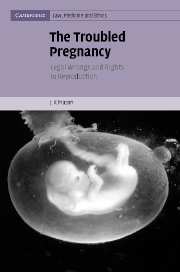Book contents
- Frontmatter
- Contents
- Preface
- Table of cases
- Table of statutes
- 1 The nature of the troubled pregnancy
- 2 Voluntary and involuntary termination of pregnancy
- 3 Antenatal care and the action for wrongful birth
- 4 Unsuccessful sterilisation
- 5 Uncovenanted pregnancy and disability
- 6 Wrongful neonatal life
- 7 The management of the disabled neonate
- 8 Conclusion
- Bibliography
- Index
6 - Wrongful neonatal life
Published online by Cambridge University Press: 19 July 2009
- Frontmatter
- Contents
- Preface
- Table of cases
- Table of statutes
- 1 The nature of the troubled pregnancy
- 2 Voluntary and involuntary termination of pregnancy
- 3 Antenatal care and the action for wrongful birth
- 4 Unsuccessful sterilisation
- 5 Uncovenanted pregnancy and disability
- 6 Wrongful neonatal life
- 7 The management of the disabled neonate
- 8 Conclusion
- Bibliography
- Index
Summary
Introduction
Thus far, we have been dealing exclusively with the effects of the birth of an unwanted or unexpected child on its parents. But what of the child itself? We have seen throughout that public policy – whether expressed by the voice of the public itself or through the medium of the courts – strives to ensure that such a child is not made aware of the unusual circumstances of its conception and birth. We have also seen that, such is the nature of humanity, most children born as a result of negligence by third parties are accepted into the family as much loved additional members – and this includes many who are disabled.
Thus, the healthy child, at least, is unlikely to resent his or her existence. There may, however, be circumstances in which a newborn child is so badly disabled that it may be inferred that he or she would rather not be alive. As Templeman LJ put it in the ground-breaking case of Re B (a minor):
There may be cases of severe proved damage where the future is so certain and where the life of the child is so bound to be full of pain and suffering that the court might be driven to a different conclusion [than that the child must live] (emphasis added).
- Type
- Chapter
- Information
- The Troubled PregnancyLegal Wrongs and Rights in Reproduction, pp. 188 - 240Publisher: Cambridge University PressPrint publication year: 2007



